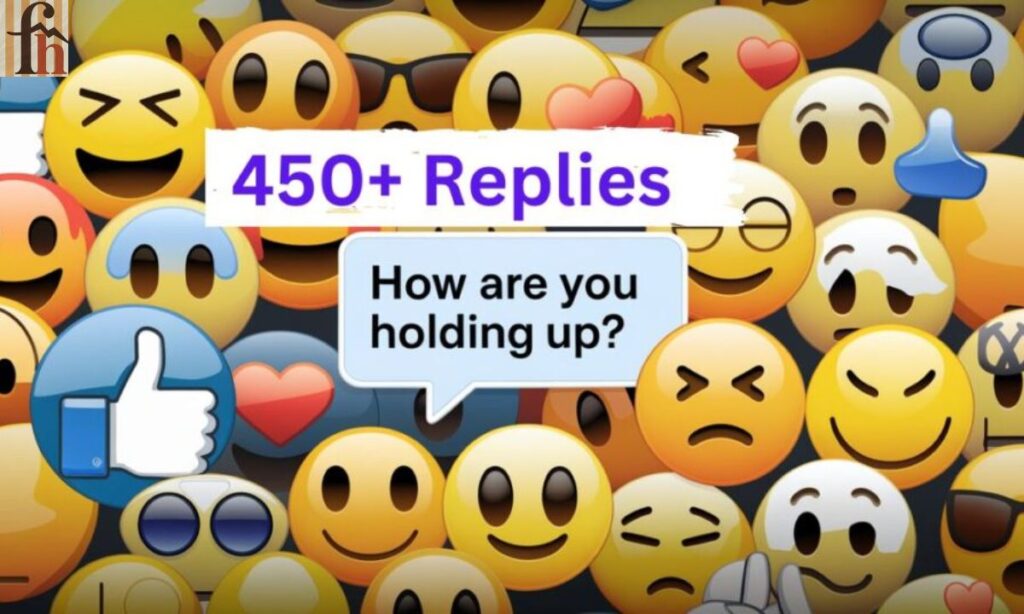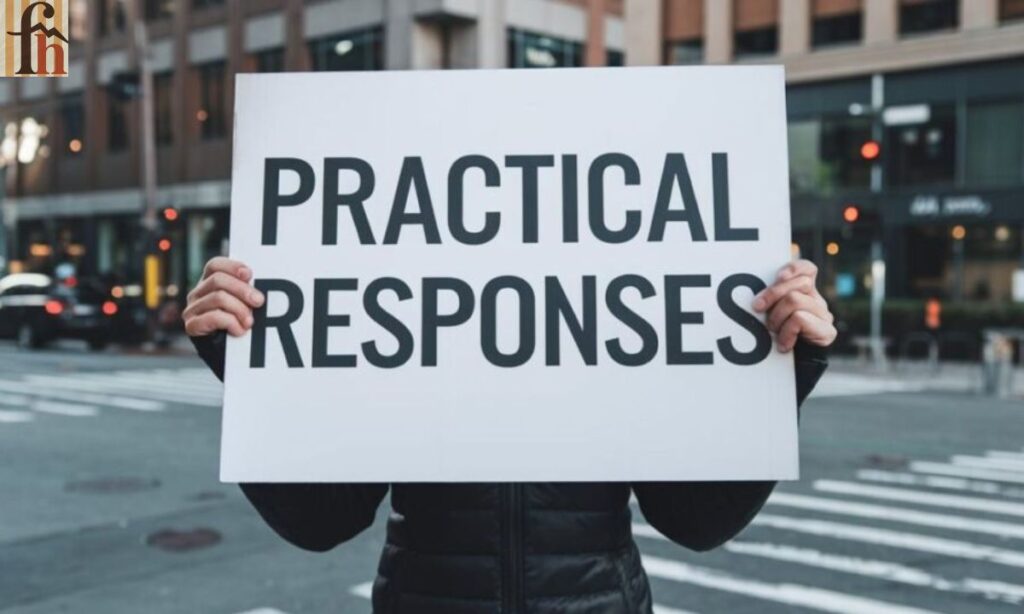When someone asks, “How are you holding up?” they want to know how you are feeling. This question is often asked during tough times. People show they care by asking this. You can reply in many ways. Some replies can be happy, like saying you are doing great. Others can be more serious if you are feeling down. It is important to choose a reply that fits your feelings.
There are many types of answers you can give. You might say, “I’m okay,” if you feel neutral. If you are feeling good, you can say, “I’m doing really well!” If things are hard, it’s okay to say, “I’m struggling a bit.” Each response helps others understand how you are doing. Sharing your feelings can help you connect with friends and family.
Understanding the Phrase “How Are You Holding Up?”
The phrase “How are you holding up?” is often used to check on someone’s emotional state. It shows concern. It is a way for people to ask if you are managing well. This question can come from friends, family, or even coworkers. It is especially common during tough times. People want to know how you are feeling. This shows empathy and support. Understanding this phrase helps us communicate better.
Why People Ask “How Are You Holding Up?”
People ask this question for many reasons. They may genuinely care about your well-being. They might notice you are going through a hard time. Some people ask out of habit. It is a common greeting. Others might want to show support. When someone asks this, it can mean they are willing to listen. It opens the door for conversation. It creates a space for sharing feelings. This simple question can mean a lot.
Read This Blog: Dejan Kacurov: An In-depth Exploration of the Tech Expert’s Life and Career
450+ Replies To “How Are You Holding Up?”

This question is often asked when things are tough. It shows that the person cares about you. You can reply in many ways. If you feel happy, you might say, “I’m doing great!” If you feel okay, you can say, “I’m alright.” If things are hard, it’s okay to say, “I’m having a tough time.”
There are over 450 replies you can use. Some replies are funny, like, “I’m holding up like a champ!” Others are more serious, like, “I’m feeling overwhelmed.” Each response helps the other person understand your feelings. Sharing how you feel can help you connect with friends and family. It’s important to be honest and choose the right words.
Positive Responses
When someone asks, “How are you holding up?” a positive response can brighten their day. Saying something like, “I’m doing great!” shows that you’re feeling good. You can also say, “I’m really happy today!” This lets others know you are in a good mood. Sharing your happiness can make the person asking feel good too.
Another positive reply could be, “I’m feeling strong!” or “I’m hanging in there!” These responses show that you are managing well. Even if things are tough, staying positive is important. It helps you and others feel better. Remember, a cheerful response can spread joy and support among friends and family.
Neutral Responses
- “I’m okay, just taking it day by day.”
- “Not too bad, just the usual.”
- “I’m managing, thanks!”
Negative Responses
- “It’s been tough lately, to be honest.”
- “I’m struggling a bit right now.”
- “Things are a bit rough, but I’m getting through.”
Honest Responses
- “I’m having a hard time, but I appreciate you asking.”
- “I’m feeling overwhelmed, but I’ll be okay.”
- “Honestly, it’s been challenging, but I’m working on it.”
Humorous Responses
- “I’m holding up like a champ—most days!”
- “Like a house of cards in a windstorm!”
- “I’m doing well, but my coffee needs a coffee!”
Professional Responses
- “I’m managing well, thank you for your concern.”
- “I appreciate your inquiry; I’m doing okay.”
- “I’m holding up fine, keeping focused on work.”
Supportive Responses
- “Thanks for checking in; it means a lot.”
- “I’m hanging in there, thanks for your support.”
- “I appreciate your concern; it helps to talk.”
Cautious Responses
- “I’m okay, but I’m taking it slow.”
- “I’m doing my best to stay balanced.”
- “Just trying to take things one step at a time.”
Content Responses
- “I’m feeling pretty content, thank you!”
- “Things are good; I have no complaints.”
- “I’m satisfied with where I am right now.”
Hopeful Responses
- “I’m hopeful things will get better soon.”
- “I’m looking forward to brighter days ahead.”
- “I believe things will improve with time.”
Appreciative Responses
- “Thank you for asking; it shows you care.”
- “I really appreciate your concern.”
- “Your support means a lot to me.”
Encouraging Responses
- “I’m hanging in there and staying strong!”
- “Just taking it one day at a time!”
- “I’m doing well, and I believe things will turn around.”
Reserved Responses
- “I’m okay, just keeping to myself.”
- “I prefer to keep things private for now.”
- “I’m managing, but I’m not ready to share much.”
Acknowledging Responses
- “I’m doing alright, thanks for checking.”
- “I appreciate you asking; it’s been a journey.”
- “I’m managing, and your concern is noted.”
Detailed Responses
- “I’ve had some ups and downs but overall, I’m okay.”
- “It’s been a mixed bag; I’m handling it as best I can.”
- “I’m coping with some challenges, but I’m staying hopeful.”
Brief Responses
- “I’m good, thanks!”
- “Doing alright!”
- “All is well!”
Direct Responses
- “I’m fine, thank you.”
- “I’m okay, really.”
- “Doing well, thanks!”
Open Responses
- “I’m open to talking if you want to know more.”
- “I’m okay, but I’d love to share more if you’re interested.”
- “I’m doing well, and I appreciate you asking!”
Reflective Responses
- “I’m reflecting on my feelings; it’s a process.”
- “I’m taking time to think things through.”
- “I’m learning a lot about myself during this time.”
Resilient Responses
- “I’m staying strong despite the challenges.”
- “I believe in my ability to get through this.”
- “I’m resilient, and I know I’ll be okay.”
Faithful Responses
- “I’m trusting the process and staying hopeful.”
- “I believe things will work out in the end.”
- “My faith keeps me strong during tough times.”
Adventurous Responses
- “I’m ready for whatever comes next!”
- “I’m taking it as an adventure!”
- “I’m embracing the challenges as learning experiences.”
Grateful Responses
- “I’m grateful for the support around me.”
- “Thank you for asking; I feel very supported.”
- “I appreciate the little things that keep me going.”
Creative Responses
- “I’m holding up like a sunflower reaching for the sun!”
- “I’m like a ship sailing through choppy waters!”
- “I’m a puzzle; still figuring out where I fit!”
Curious Responses
- “I’m okay! How about you?”
- “I’m doing fine, and I’d love to hear how you are!”
- “I’m good; what about you?”
Balanced Responses
- “I’m finding balance in the chaos.”
- “I’m managing my time and feelings well.”
- “I’m working to keep a balanced perspective.”
Practical Responses
- “I’m taking practical steps to feel better.”
- “I’m focusing on what I can control.”
- “I’m keeping it practical and manageable.”
Energetic Responses
- “I’m feeling energized and ready to tackle anything!”
- “I’m full of energy and optimism today!”
- “I’m buzzing with positive vibes!”
Generous Responses
- “I’m doing well, and I hope you are too!”
- “I’m fine, and I wish the same for you!”
- “I’m okay; let’s focus on your well-being too!”
Open-minded Responses
- “I’m open to new experiences and learning.”
- “I’m embracing change and staying flexible.”
- “I’m open to different ways of coping.”
Cultural Variations in Responses

Different cultures have unique ways of responding. In some cultures, it is common to share feelings openly. In others, people may prefer to keep emotions private. Understanding these differences is important. It helps us communicate better. This awareness can strengthen relationships. It shows respect for cultural values.
Tips for Crafting Your Response
When replying to “How are you holding up?” consider your feelings. Think about who is asking. Your response can depend on your relationship. Be honest but respectful. Keep it simple or go into detail as needed. You can choose to share or keep things light. The important part is to communicate meaningfully.
Psychological Impact of Responses
Responses to this question can have emotional effects. Positive replies can boost morale. They create a sense of connection. Negative responses may invite more supportive conversation. It is important to be mindful of how we communicate. Our words can uplift or bring down. Understanding this can improve our interactions.
Frequently Asked Questions
How are you holding up with meaning?
This phrase is a way to ask about someone’s emotional state. It shows concern for their well-being.
How do I respond to “How are you holding up?”
You can respond positively, negatively, or neutrally depending on your feelings. Be honest about your emotional state.
What does it mean when someone is holding you up?
If someone is “holding you up,” it means they are supporting you emotionally or physically during tough times.
How to respond to how are you coping?
You can share how you are managing, whether it’s good or bad. Be honest about your feelings.
What’s a flirty response to “how are you?”
A flirty response could be, “I’m doing great, but I’d be even better with you!”
Conclusion
In conclusion, the phrase “How are you holding up?” is more than a simple question. It reflects empathy and concern. Your response can vary based on your feelings and the context. Understanding this phrase and crafting thoughtful replies can improve communication. It strengthens social connections. Remember, your emotional well-being is important. Choose your words wisely, and don’t hesitate to reach out for support when needed. Communication is key to emotional health and resilience.

He is a talented content writer and digital marketer with expertise in SEO, social media management, and online marketing. He excels at creating impactful, data-driven content to help businesses connect with their target audience and achieve measurable outcomes.





